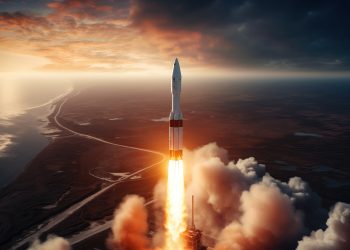For years, scientists have envisioned using nuclear rockets to make trips to Mars faster and more efficient. Nuclear propulsion, fueled by nuclear fission, has the potential to significantly reduce the travel time between Earth and Mars—something that could transform the future of space exploration. However, while the concept seems promising, bringing it to life presents a number of challenges.
The Appeal of Nuclear Rockets
The idea of using nuclear fission in space travel is enticing for one main reason: speed. Traditional rockets powered by chemical propulsion take a long time to travel vast distances in space, which can be a major obstacle for manned missions. A trip to Mars using conventional technology could take years. Nuclear rockets, on the other hand, have the potential to cut that journey time considerably by harnessing the energy released from splitting atoms.
As nuclear engineering expert Dan Kotlyar explains in The Conversation, nuclear thermal propulsion could revolutionize space travel by reducing mission durations. This efficiency would be critical for the health and safety of astronauts on long-distance missions, where exposure to cosmic radiation and the psychological strain of isolation are serious concerns.
The Uranium Dilemma
However, the use of nuclear technology in rockets comes with a set of complications, particularly surrounding fuel. Most nuclear rockets rely on enriched uranium, a material that has a history of controversy due to its connection to nuclear weapons. In the 1950s and 60s, government programs like those of the United States funded extensive research into nuclear propulsion. Companies such as General Electric even played a role in early experiments that used enriched uranium to power rocket engines.
Unfortunately, enriched uranium’s association with atomic bombs has led to heavy regulation and a general mistrust of its use. Today, obtaining this material for peaceful space exploration is not an easy task, especially since recent geopolitical tensions have restricted its availability.
Finding a Safer Alternative
To address these issues, the U.S. Department of Energy launched the Global Threat Reduction Initiative in 2009, aiming to repurpose highly enriched uranium for safer uses. The result of this effort is the development of high-assay, low-enriched uranium (HALEU) fuel. HALEU contains far less fissionable material than its highly enriched counterpart, making it safer but less efficient for rocket propulsion.
The downside? Rockets would need to carry more HALEU fuel to achieve the same energy output, which in turn makes the spacecraft heavier—a significant drawback for space missions where minimizing weight is crucial. While researchers continue to explore ways to improve the efficiency of nuclear rockets, the added weight of HALEU remains a challenge that must be overcome.
Future Hurdles in Nuclear Propulsion
Beyond the technical and logistical issues of fuel, there are other obstacles that stand in the way of nuclear-powered space exploration. One significant barrier is the ongoing difficulty of securing enriched uranium for these programs, especially in light of recent political tensions. The Biden administration, for instance, placed a ban on uranium imports from Russia, a major supplier of the material. This could further complicate efforts to advance nuclear propulsion technology for future Mars missions.
While the dream of using nuclear rockets to reach Mars faster is still alive, it’s clear that achieving it will require overcoming a series of complex challenges. The next steps in space exploration could depend on breakthroughs in nuclear engineering and international cooperation, but for now, these hurdles remain significant.










